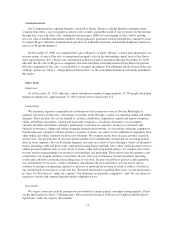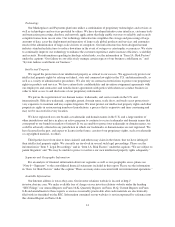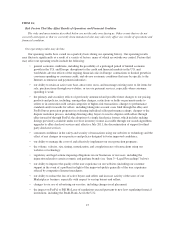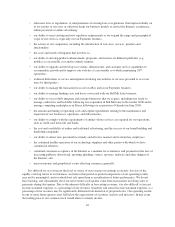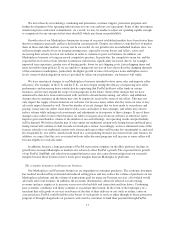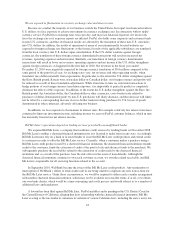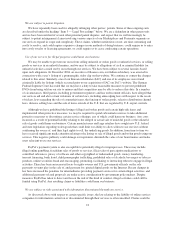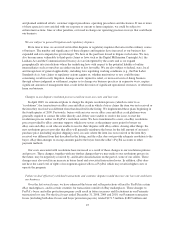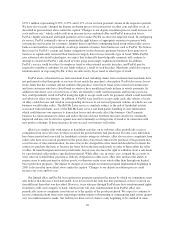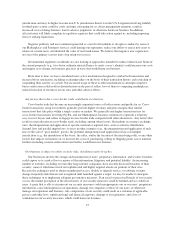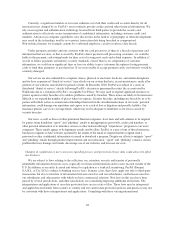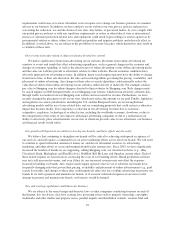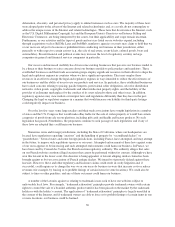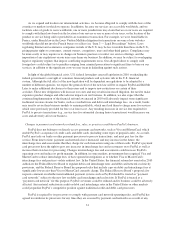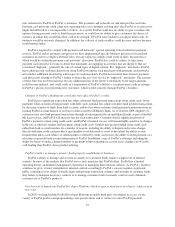eBay 2010 Annual Report Download - page 27
Download and view the complete annual report
Please find page 27 of the 2010 eBay annual report below. You can navigate through the pages in the report by either clicking on the pages listed below, or by using the keyword search tool below to find specific information within the annual report.The listing or sale by our users of pirated or counterfeit items may harm our business.
We have received in the past, and we anticipate receiving in the future, communications alleging that certain
items listed or sold through our service by our users infringe third-party copyrights, trademarks and trade names,
or other intellectual property rights. See “Item 3 — Legal Proceedings” below. Although we have sought to work
actively with the owners of intellectual property rights to eliminate listings offering infringing items on our
websites, some rights owners have expressed the view that our efforts are insufficient. Content owners and other
intellectual property rights owners have been active in asserting their purported rights against online companies,
including eBay. Allegations of infringement of intellectual property rights have resulted in threats of litigation
and actual litigation against us from time to time by rights owners, including litigation brought by luxury brand
owners such as Tiffany & Co. in the U.S., Rolex S.A. and Coty Prestige Lancaster Group GmbH in Germany,
Louis Vuitton Malletier and Christian Dior Couture in France and L’Oréal SA, Lancôme Parfums et Beauté &
Cie and Laboratoire Garnier & Cie in several European countries. The plaintiffs in these cases seek to hold eBay
liable for alleged counterfeit items listed on our sites by third parties, for “tester” and other consumer products
labeled in a manner to prevent resale and for unboxed and other allegedly nonconforming products listed on our
sites by third parties, for the alleged misuse of trademarks or copyrights in listings or otherwise on our sites, or in
connection with paid search advertisements, or for alleged violations of selective distribution channel laws or
parallel import laws for listings of authentic items, or for alleged non-compliance with consumer protection laws.
Such plaintiffs seek, among other things, injunctive relief and damages. In the aggregate, these suits could result
in significant damage awards and injunctions that could adversely affect our business. These and similar suits
may force us to modify our business practices, which could lower our revenue, increase our costs or make our
websites less convenient to our customers. Any such results could materially harm our business. In addition,
rights owners have aggressively sought to reduce the applicability of limitations to intellectual property rights
such as copyright exhaustion and the first sales doctrine in cases such as Vernor v. Autodesk Inc. (Ninth Circuit
Court of Appeals) and Costco Wholesale Corp. vs. Omega S.A. To the extent such doctrine are limited, the
supply of goods available for resale on eBay may be adversely affected.
In addition to litigation from rights owners, we may be subject to regulatory, civil or criminal proceedings
and penalties if governmental authorities believe we have aided in the sale of counterfeit goods. While we have
had some early success in defending against such litigation, more recent cases have been based, at least in part,
on different legal theories than those of earlier cases, and there is no guarantee that we will continue to be
successful in defending against such litigation. Plaintiffs in recent cases have argued that we are not entitled to
safe harbors under the Digital Millennium Copyright Act in the U.S. or as a hosting provider in the European
Union under the Electronic Commerce Directive because of the alleged active nature of our involvement with our
sellers, and that, whether or not such safe harbors are available, we should be found liable because we supposedly
have not adequately removed listings that are counterfeit or are authentic but allegedly violate trademark or
copyright law or effectively suspended users who have created such listings. We are continuously seek to
improve and modify our efforts to eliminate counterfeit and pirated items. These improvements are in response to
ongoing business initiatives designed to reduce bad buyer experiences and improve customer satisfaction as well
as in response to new patterns we are seeing among counterfeiters and others committing fraud on our users.
Notwithstanding these efforts, we believe that the legal climate, especially in Europe, is becoming more adverse
to our positions, which may require us to take actions which could lower our revenues, increase our costs, or
make our websites less convenient to our customers, which may materially harm our business. In addition, a
public perception that counterfeit or pirated items are commonplace on our sites, even if factually incorrect,
could damage our reputation and our business.
Content owners and other intellectual property rights owners may also seek to bring legal action against
entities that are peripherally involved in the sale of infringing items, such as payment companies. To the extent
that intellectual property rights owners bring legal action against PayPal based upon the use of PayPal’s payment
services in a transaction involving the sale of infringing items, including on our websites, our business could be
harmed.
22



